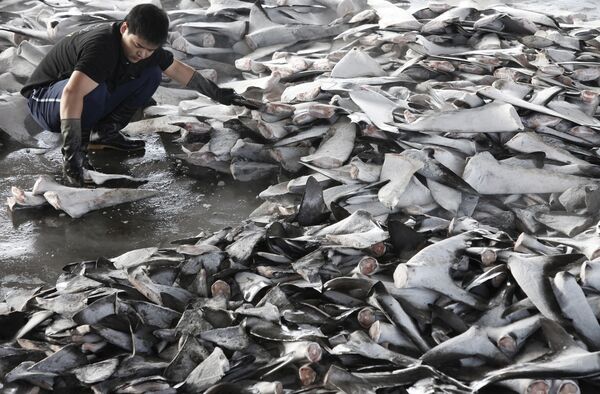Shark fin has been a delicacy in China for centuries. It was originally a dish reserved solely for the Emperor and his court but it has become increasingly popular among a growing middle class in China.
Marine Scientist, @MariahPfleger makes a compelling case for shark fin trade bans! https://t.co/3e4SDhrUBj @SFriedScience #FinBanNow pic.twitter.com/6i36mBlEJV
— Mission Blue (@MissionBlue) May 15, 2017
"Everyone now wants to look rich and impress their peers. This had led to unsustainable industrialized fishing whereby sharks are being targeted for their fins by massive fishing fleets from Asia and Europe. Anywhere there is a coastline sharks are not safe. The supply chain of the shark fin industry is run by transnational organized crime syndicates riddled with corruption and abuses," Alex Hofford, who runs the pressure group WildAid in Hong Kong, told Sputnik.
Shark fin soup is also served in swanky Chinese restaurants in Europe and North America and it relies on a steady supply of fresh fins, usually flown in on cargo planes.

It is estimated that 73 million sharks a year are killed for their fins and marine scientists say that number is not sustainable. Hammerhead shark fins sell in Hong Kong for US$1,000 per kilo.
"Shark populations around the world are being wiped out in large part due to an out-of-control shark fin industry in Hong Kong. Some shark populations are down by over 90 percent. Oceanic whitetip sharks and hammerheads are particularly at risk from Hong Kong's rapacious shark fin trade," Hofford told Sputnik.
#4WordLetDowns People eating shark fin. pic.twitter.com/cV4buzdNEk
— HelenTheShark (@HelenTheShark) May 8, 2017
WildAid has been shaming airlines and freight companies into agreeing to include shark fin on a list of items they will not transport.
Cathay Pacific was the first airline to ban shark fin, followed by shipping line Maersk.
In 2013 a luxury hotel chain in Thailand removed the dish from their menu.
"Since then it has been like a domino effect, with many players in the corporate sector stepping up to ditch unsustainable practices," Hofford said.
Air China, China Southern Airlines, UPS, DHL and many others have come on board. It is beginning to impact on the trade too.
According to WildAid's annual report, imports of shark fin into China have decreased by 81 percent between 2011 and 2014.

But Hofford says some companies are stubbornly refusing to introduce a ban and he cites FedEx as a classic example.
"The official line from FedEx is that everything they do is legal. But the legal problem facing them is that shark fins from a species that is legal for export look extremely similar, if not identical, to sharks fins from a species that is illegal for export. Quite simply, both are gray and triangular. FedEx has yet to clarify to the public how its staff can accurately differentiate between the two," he said.
Two senators — Cory Booker from New Jersey and Shelly Moore-Capito from West Virginia, have introduced a Shark Fin Trade Elimination Act in Congress in March.
Shark finning is wasteful and inhumane. Tell your representatives: We need a #FinBanNowhttps://t.co/96LPr2mCsT pic.twitter.com/rilSmkqWgh
— Oceana (@Oceana) May 16, 2017
If it is passed it would ban the buying and selling of shark fins in the United States.
Marine scientist Mariah Pfleger said: "The demand for fins fuels finning — the act of slicing off a shark's fins and dumping the body back into the ocean.
"The United States is still importing fins from places like Hong Kong, China, New Zealand, the Netherlands, Spain, South Africa and Indonesia…by purchasing these fins, the United States is sustaining the demand for this unsustainable practice."
So what can consumers do?
"To protect sharks, consumers should definitely say no to shark fin soup," Hofford told Sputnik.
WildAid is running an online petition in a bid to persuade Maxim's, a Hong Kong chain with 70 restaurants selling shark fin soup, to remove it from their menu and has collected 5,000 signatures in two weeks.
Some people might not shed too many tears for sharks.
Maxim's Restaurants in Hong Kong: Please STOP Selling Shark Fin! https://t.co/s4s9RVZZNH
— Born Free Foundation (@BFFoundation) May 3, 2017
Earlier this week footage emerged of a helicopter spotting a group of 15 great white sharks swimming near a group of surfers in California.
But Hofford told Sputnik: "As apex predators, sharks play a crucial role in maintaining marine biodiversity. Over 70 shark species are now at risk of extinction."
In April it was reported that Syrians, unable to get their hands on meat during the civil war, are resorting to eating shark meat, endangering shark numbers in the eastern Mediterranean.


